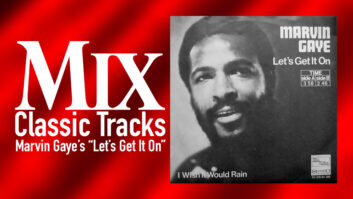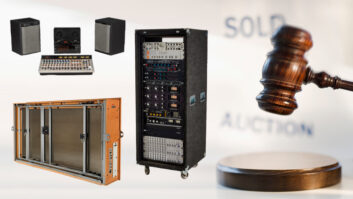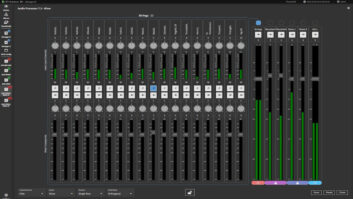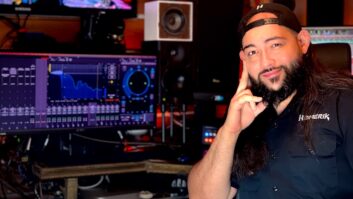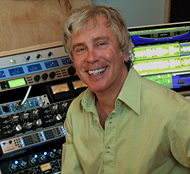
Mastering engineer Adrian Carr opened ACMastering in his Montreal home in 2008 after a long career in New York City.
The owner of ACMastering in Montreal, whose studio is profiled in Mix’s December 2009 “Project Studio,” shares his thoughts about the broader issues in mastering today and describes how he got started.
In “Project Studio,” you note how much the audio industry and your profession changed between 2005 and 2008, from the time that you took a break from the industry in New York City until you built and opened your own project room in your new Montreal home. What is your work like for you now?
I’m always updating my Website, Facebook, LinkedIn, blogs and forums. I spend a couple of hours—every day, probably—just doing Web work. It’s so much a part of our industry now, and for me it’s my business. Quite by accident I’ve come across this new business model for mastering, whereby I rarely have an attended session. I opened up here on the South Shore of Montreal and yet most of my business is coming via Internet, so I don’t do attended sessions.
I’ve heard other producers and engineers talk about this, too—that part of their workflow is getting up in the morning and answering e-mails.
Absolutely! It’s so important, because if someone is going to look for a mastering room, they’re either going to get a personal recommendation or they’re going to go to the Internet. They’re not going to go to the phone book.
Judging from the credits on your Website, it looks like a lot of your work in New York City came from record labels.
Yeah. A lot of the New York work came from labels, but of course many of the labels are gone. I was just at AES [in October 2009], and really, the industry is focusing on the indie people now to keep it alive. There’s a good side to that and there’s a sad side to that. I understand it’s good that you can be an indie artist today and I think that’s absolutely fantastic, but there’s a certain corporate approach to doing business that makes it easier sometimes, and then there’s a budget and things like that, where in the indie market today, everything has been redefined and my rates are about half of what I used to charge.
Right, because the budgets aren’t there to support many of these projects.
Exactly—the budgets aren’t there. Of course I would have to say something about home recording, too, which has created probably one of the biggest shifts in our industry, because in New York it’s really something to see how many studios aren’t there anymore. And this is of course a phenomenon across the country because everybody’s recording in their homes with Pro Tools, and that’s good in some ways. It’s great to be able to record your own stuff where you want to, when you want to; but of course the quality and the knowledge is not the same at all today because they’re musicians—they aren’t engineers. They just want to record because they’re artists! That’s great, but [now] I have to spend a certain amount of time trying to help people. If I have a good product to work with, then of course [I’ll make] it so much better.
In our December 2009 issue feature “Another Gray Area,” Mix asks mastering engineers to tell us how their jobs have changed in recent years due to low-cost tools and lower budgets, so it would be good to address that from your perspective.
I find I have to be much more aggressive now in my mastering, and by “aggressive” I don’t mean level. I mean I have to do so much more to make something sound good and I have to have so many more tricks now than I had before.
Ten years ago, I had my Weiss EQ and Weiss limiter. You wouldn’t take apart the mix. You wouldn’t do a lot of these things that you have to do today. You wouldn’t use restoration hardware on a mix because you would respect the mix and what the mixing engineer did. But today you have to do oh so many tricks. Sometimes it makes my job interesting in that I get a mix and I say, “Oh, boy!” That’s my first reaction. Then I have to look for a way that I can draw the best that I can out of that and I’m not shy about really changing the mix today to make it sound better, whereas before I wouldn’t do that. So that’s one thing that’s changed. Obviously if I get a classical mix from an established engineer [laughs] I’m not going to start pulling that apart. But with a lot of the indie stuff that comes in, I really have to be much more aggressive in my job.
I don’t know if it’s possible to talk in general terms, but what kind of audio quality are you hearing? Do you have to go the extra mile more often than not?
I find that I am, definitely, although I get some good sounding stuff. If you’re talking to other mastering engineers, one thing I’m sure that’s going to be a common theme is level. Mix engineers are being pushed by their clients to deliver louder mixes with more limiting [and] more compression on them, and so more often than not I’ll get a very loud mix that’s plus-10, plus-12 on the VU meter in terms of RMS. It’s a challenge for me to see what I can do once I’ve got that really hot level. As a general rule, when the waveform looks like a sausage on the screen that means it’s basically well cooked— there’s no headroom for the mastering.
When I get mixes that are less compressed or less limited, at least I don’t have to work against what’s already there. When I was at AES, though, all the mastering engineers were saying the same thing about getting mixes that are really hot. Sometimes you just have to go back to the engineer and say, “Can you give me a mix that just isn’t slammed to the max?”
The loudness issue has been discussed in the pages of Mix for a few years now. Is it a matter of educating musicians, and perhaps recording and mix engineers, to avoid slamming the volume levels so much?
I try to. They would probably not do it, but their clients are pushing them [to do it]. I’ve got a YouTube channel and I try to educate people, and I have information on my Website.
One thing I’ve noticed today is that people don’t listen to music standing still. Back in the days of vinyl, you had to sit down to listen because if you jumped around too much the needle would never stay on the record! That was a nice thing—it was almost like meditation, and a lot of people got into it. That doesn’t happen anymore because everybody listens to music either in their car or on their iPod. And so the dream of having this great dynamic range, which was what digital was all about, has been completely erased. If you’re listening in the car and there’s too much dynamic range, you don’t hear stuff—it just drops out because of the noise floor. And it’s the same with an iPod: [people are] walking or jogging or doing something with their music, and if it’s too soft, then they can’t hear it.
Do you think the importance of mastering is becoming lost on self-taught indie artists and recordists who are coming up today?
A lot of indie clients say, “Why should I master?” I know a recording engineer up here who said to me, “The band says that they’re paying me to do their recording, so they think that I’m not being very proficient if I say I want to go to a mastering engineer to do the mastering.” The band says, “We’re not paying for mastering; you put a plug-in on that and we’ll be done.” So a lot of musicians don’t understand that [recording, mixing and mastering are] different processes—that one follows the other and one adds to the other. They don’t understand the process and really, the benefits of going to a mastering engineer.
How did you decide to specialize in mastering? What was it that drew you into it from your recording background?
I met Vlado [Meller]. It was a chance meeting on 9th Avenue at this Italian Restaurant we both liked. Vlado was working at Sony [Mastering] and it was only a few blocks from my studio at the Film Center Building. It was really his inspiration and his generosity that got me into mastering, because after meeting Vlado I realized, wow, this is something where I could make a really big impact on the overall picture of sound. It really seemed to speak to me and all my proclivities and everything I had done in my life up to that point, being a composer and looking at the big picture. A year after meeting him, I decided I wanted to do mastering and changed my whole studio around in New York. I started learning everything I could from Vlado and for the last seven years, in my [New York] studio, just did mastering. That’s really how it happened for me.
Did you have to start over again at that point, as far as clientele and getting the word out that you’re doing mastering instead of recording?
Yeah. I was still doing a little bit of classical recording at that point, when people would ask me, but I was definitely getting the news out there that I was doing mastering. It was a complete change-around in the studio, and because it was such a change-around, I really understood how different the tracking room and the mixing room are from a mastering studio.
For me, [being a mastering engineer is] all I want to do. I just want to make great sounding masters, so I’ll take the time to learn about a piece of gear or what this plug-in does and I’ll read every little thing that they say about it, and then I’ll go on YouTube and search for who else is using this, and has the manufacturer made a video detailing this. I’ll really spend time learning about what I have because for me that’s time well spent.

